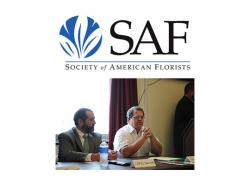Congressional ACA Briefing Features Minnesota Grower
October 9, 2014 | 3 min to read

ALEXANDRIA, VA — What a difference seven months (and a whole lot of hard work) can make.
“Congress needs to clean up the ACA and give us a template to do it correctly,” said Troy Lucht (right), one of three speakers featured during a bipartisan congressional briefing on the impact of the Affordable Care Act on small businesses (on his left, Chris Savvides, Black Angus Restaurant in Virginia Beach, Va.).
That sentiment ran through Troy Lucht’s mind on Oct. 2 when he addressed a briefing room filled with congressional staff members. Lucht, of Plant Source International & Malmborg’s Inc. in Rogers, Minn., traveled to Washington, D.C., to share his story, and to explain to staffers why a technical fix is necessary to correct the Affordable Care Act’s (ACA) multiple, confusing definitions of seasonal employment.
“One of my goals was to help them understand just how seasonal some businesses are,” said Lucht, the chairman of the Society of American Florist's (SAF) Government Joint Council. “For instance, 91 percent of our wholesale sales happen in the first half of the year. We’re not some big business; we have a skeleton crew most of the year.”
Unfortunately, the ACA as currently written, doesn’t reflect that reality, Lucht explained, adding that if Congress doesn’t act soon to correct the confusion, many business owners risk significant fines for noncompliance — through no fault of their own.
“Right now, there’s a lot of misinformation out there,” Lucht told the crowd, which included staff members from 79 congressional offices. “I’m not trying, as an owner, to avoid the cost of health insurance. I want to do this right, but to do that, Congress needs to clean up the ACA and give us a template to do it correctly.”
Audience members lined the walls and even gathered in the hallway to listen to Lucht and the two other featured speakers (a restaurant owner and a fruit and vegetable farmer). Their obvious interest in the challenges posed by current ACA definitions stood in stark contrast to the reception Lucht and other floral industry members received in March during SAF’s Congressional Action Days, when the issue of seasonal workers/employees generated a “deer in the headlights” look among many members of Congress and their staff members, Lucht said.
“At that time, so many of them had never heard about the issue,” he explained. “For many of them, I think Congressional Action Days was the first time they realized that [the confusing definitions] could be a big problem.”
Since then, SAF has led the charge on a coordinated push to move the issue up the congressional agenda, with significant success: Bipartisan bills to provide the needed fix have been introduced in both the House and Senate.
Stories from SAF members that capture the challenges created by the current bill have been critical to the effort to correct it, said Corey Connors, SAF’s senior director of government relations, who praised Lucht’s recent presentation to the packed room.
“Troy did a fantastic job representing his business and the floral industry,” he said. “To think that nine, 10 months ago very few people were thinking about this issue at all and now we have two bills with bipartisan support and 79 congressional offices represented at one briefing? That’s moving the needle.”
Connors also stressed that the work is far from complete. “Now, more than ever, is a critical time to get out there and talk to people, tell your representatives and senators” why these issues matter to you and ask them to co-sponsor the House and Senate bills, he said. “Their ears are open. They’re listening."
SAF makes it easy to contact lawmakers directly to ask them to co-sponsor the House and Senate versions of the STARS Act (H.R. 5213 and S. 2881). Go to safnow.org/write-to-congress for a suggested message to send.
The Society of American Florists is the leading organization representing all segments of the floral industry. SAF is proud to provide marketing, business and government services to its members, including growers, wholesalers, retailers, suppliers, importers, educators, designers and allied organizations. The association was chartered by an act of Congress in 1884.
Source: The Society of American Florists
